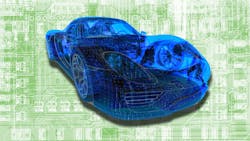Maximize Thermal Performance in Automotive DC-DC Converters (.PDF Download)
A dc-dc converter is an electric circuit that converts a source of direct current (dc) from one voltage level to another by storing the input energy temporarily and then releasing that energy to the output at a different voltage. Converters protect electronic devices from power sources that are too strong or step up the level of the system input power to ensure it runs properly. The push to higher power density and the necessity for higher efficiency makes a modular dc-dc converter a demanding environment for power ICs, requiring designers to set new standards in thermal resistance and volumetric efficiency.
All dc-dc converters dissipate power in the form of heat. This heat must be managed properly so that the converter maintains operation within the recommended temperature limits to improve reliability and prevent premature failure. With power components coming in smaller and smaller surface-mount packages, it’s important to lessen the thermal-dissipation demands of these components. Unfortunately, as electronic parts get smaller, it becomes harder to secure the surface area in contact with air that’s necessary to achieve effective heat dissipation.
